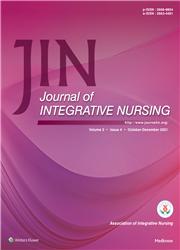Application of five-element music therapy in pain coping skills training in patients with knee osteoarthritis
Q4 Nursing
引用次数: 2
Abstract
Objective: The objective of this study is to assess the application effect of five elements music therapy introduced in the pain coping skills training of knee osteoarthritis (KOA). Materials and Methods: Totally, 80 patients with KOA were selected and randomly divided into the experimental group (39 cases) and the control group (41 cases). The control group was only given routine nursing measures, and the experimental group was additionally treated with five-element music therapy on the basis of the control group, twice a day, 28 days in total. The Western Ontario and McMaster Universities Osteoarthritis Index (WOMAC) was used to evaluate the functional status of the knee joint of the two groups. The clinical efficacy of the two groups was evaluated by Guiding Principles for Clinical Research of New Chinese Medicine in the Treatment of Osteoarthritis. Results: WOMAC score statistically significantly decreased in the experimental group (35.92 ± 9.48 vs. 16.17 ± 5.43, P < 0.01) and the control group (36.73 ± 6.42 vs. 22.53 ± 7.51, P < 0.01) after 28 days of intervention when compared with that before intervention; WOMAC score in the experimental group was lower than that of the control group after 28 days of intervention (16.17 ± 5.43 vs. 22.53 ± 7.51, P < 0.01). The total effective rate of the experimental group was statistically higher than that of the control group (82.0% vs. 51.2%, χ2 = 11.97, P= 0.003). Conclusion: The combination of five-element music therapy and routine nursing measures has better effect in relieving pain and bad emotions of patients with KOA when compared with routine nursing measures alone.五行音乐疗法在膝关节骨关节炎患者疼痛应对技能训练中的应用
目的:探讨五行音乐疗法在膝关节骨关节炎(KOA)疼痛应对技能训练中的应用效果。材料与方法:选择80例KOA患者,随机分为实验组(39例)和对照组(41例)。对照组患者仅给予常规护理措施,实验组患者在对照组基础上加用五行音乐治疗,每天2次,共28天。采用西安大略和麦克马斯特大学骨关节炎指数(WOMAC)评估两组膝关节的功能状态。参照《新中医药治疗骨关节炎临床研究指导原则》评价两组患者的临床疗效。结果:干预28 d后,实验组患者WOMAC评分(35.92±9.48比16.17±5.43,P < 0.01)、对照组患者WOMAC评分(36.73±6.42比22.53±7.51,P < 0.01)较干预前显著降低;干预28 d后,实验组的WOMAC评分低于对照组(16.17±5.43∶22.53±7.51,P < 0.01)。试验组总有效率高于对照组(82.0%比51.2%,χ2 = 11.97, P= 0.003)。结论:五行音乐疗法与常规护理措施相结合,在缓解KOA患者疼痛及不良情绪方面效果优于常规护理措施。
本文章由计算机程序翻译,如有差异,请以英文原文为准。
求助全文
约1分钟内获得全文
求助全文
来源期刊

Journal of Integrative Nursing
Nursing-General Nursing
CiteScore
0.40
自引率
0.00%
发文量
3
审稿时长
17 weeks
 求助内容:
求助内容: 应助结果提醒方式:
应助结果提醒方式:


